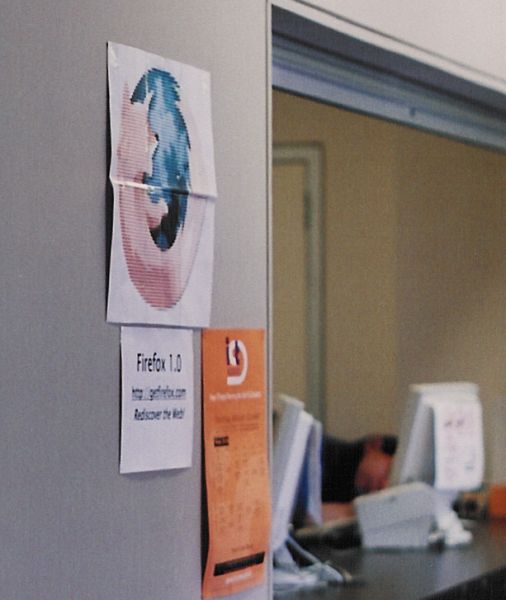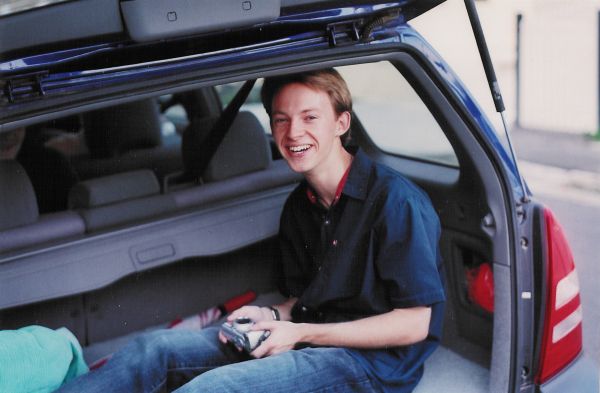28 Nov 2004
I just fired off my last assessment to the HP LaserJet 2100 downstairs. It’s the first assessment I’ve written… for a long, long time, that’s under 1000 words. Yes, it’s for ITF, the least academically taxing of all my subjects, Business Studies included. Sigh.
That’s what happens when something is marked as “Competent/Not Competent”. The notification informed me I was supposed to get the whole stupid thing bound at Kinko’s,
… so that it actually looks like an installation manual.
Oh, it’s supposed to actually look like an installation manual, hey? I’ll pass the document through Babelfish a few dozen times, and then the language will closer resemble a “real” installation manual. Grrrr.
Needless to say, I grabbed my favorite stapler and jumped on it for a while. It’s not “professionally bound”, sorry. That’s what you get when there aren’t actually explicit assessment criteria outlined — students who don’t really care what they hand in, because showing they “know stuff” is enough to get graded as “competent”. That was worth 20% of my internal assessment for the year, just for the record.
27 Nov 2004
That’s all I want! AHHHHH!!!! Sitting in my home directory (/home/josh) on the hard disk of my primary desktop, currently in storage, are two files. My OPML feeds list and a vCard contacts list. I think I’m going to cry.
27 Nov 2004
As previously mentioned, there has been a relocation of sorts occurring in these parts over the last several days, during which time I have lived a most unusual kind of life. As always, “unusual” is entirely subjective, and pertains only to my normal pattern of existence. Incidentally, existence is one of those words I’m never sure if I’m spelling correctly or not… and generally can’t be bothered to check, more so now. For a few reasons. One, I’m trying to conduct other work whilst composing this message, and asides such as
dictionary.com consume far too much time and/or effort — I will inevitably end up flicking to the thesaurus, and spend hours devouring various information about synonyms and antonyms, and, if I drift back to dictionary.reference.com, where I further immerse myself in all kinds of other mindless (or perhaps not so mindless, but certainly not relevant to the task at hand) reading.
ANYWAY. Asides are bad. Enjoyable, but a vice of sorts.
So, I last posted on Tuesday. After I’d scanned, resized, uploaded and posted those two images (alas, there is no wonderful digital camera technology at work here, a fact which brought me great discomfort as I discovered that a roll of 24 had misfed, and I had captured 24 shots of nothingness!), the two remaining computers were reduced to one — and even that was packed neatly into a bag to be transported. My regular Linux monstrosity now sits in storage, as does everything but the laptop I now type on. Incidentally, I have located the Xircom network adapter for this thing — the means by which I now communicate with the world (other credits go to Telstra BigPond cable, and a nifty patch panel and the like… more on that, later.) — so that was good.
Aside: Thanks for loan of your PCMCIA card, Dale :) Unfortunately, Windows ME didn’t play nicely with default drivers, and I eventually gave up… I’ll get it back to you sometime in the near future!
And so most of my life was packed. I filled one more box, cleared up miscellaneous garbage, threw a bit more stuff out, taped some boxes shut, discovered I’d left my bin unpackaged, couldn’t be bothered re-opening boxes, and subsequently left the bin to do whatever it would in storage. It’s a mildly unexciting object, so I figured I may just buy a new one upon finally moving to a new place of (more) permanent residence. And then I fell asleep, too late at night (or morning?).
Which, so it seems, has been the story of my week — I started on 5 hours sleep, then managed to get about the same every night until Thursday, when I got home, collapsed into bed with my head about to implode (or explode, or something…), and didn’t awake until the next morning; I got up for about half an hour, then fell back into bed until the next morning.
It’s hit Saturday now, and the headache has gone away, but I’m still stupidly tired, despite copious quantities of sleep and a day spent at home doing… very little.
Actually, I got a bit done. I setup the ‘net connection from which I now type, which was interesting, and involved shuffling of my USB disk up and down stairs in order to automagically get the BigPond Cable login client onto my laptop — you’d think they could use some kind of uber proxy to direct unauthenticated users to a download page to let them grab the login client, but evidently not — anyway, that was fairly uneventful (although deciphering someone’s handwriting in order to get the password was a little… interesting). I’m kind of wondering why there isn’t just a router setup here, given that they’ve got a 12 or 16U cabinet with a patch panel, switch, and cable modem in it… but hey, it works, so I’m not complaining.
I also struggled to setup a network laser printer using IPX/SPX, which was… interesting, to say the least. At last I stumbled upon a nice application from HP which basically autodetects everything on your network for you, and sets it all up, which was nice of it! So now I have a snappy Telstra link, and a laser printer (which lives downstairs, meaning that I’ll probably be a little more restrained in my paper/printing usage — defininitely a GOOD thing!) which is snazzy.
Ummm… yes. So that was yesterday in a nutshell. I also put together a couple of quotes, and read Les Misérables for a bit, and slept a bit more. Then spent too long on the phone, watched the first half-hour of Notting Hill (the movie goes downhill from there, I think!), and read, before once again falling asleep. Lots of sleep was had.
I have an assessment of sorts due Monday, but I can sort of negotiate that one back to Tuesday of next week, on account of being notified somewhat late, if I so desire. Which I think I do. So I will.
27 Nov 2004
An amusing — and interesting — read, over at a webpage entitled [strike out]. Yet another case for Adobe PDF as a document distribution standard? Microsoft stubbornly continue to be one of the few remaining (large) IT companies who persist in using software designed for authoring, not redistribution, over the PDF format.
Cool though this feature of Word may be, it’s a shame the creators (speaking of Microsoft as a collective, not individual programmers) of this software have to be so ignorant…
23 Nov 2004
I haven’t got time to post (and likely won’t properly for a few weeks, at least — my email may also be out for a period of a few days, depending on transition), due to work and moving and everything else, but I thought I’d share a couple of photos (completely unrelated).
This first one comes from my Firefox propaganda-ing escapades, which was mildly successful in my mind. Yes, that is someone crashed out on the desk in the background…

And this one, of my esteemed friend, Michael Dale — so esteemed, in fact, that we shoved him in the boot of a car for transport on his 18th birthday!

Hey, it was a big boot!

